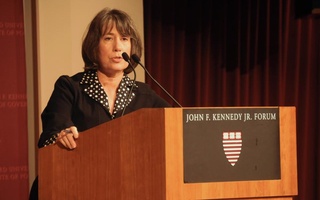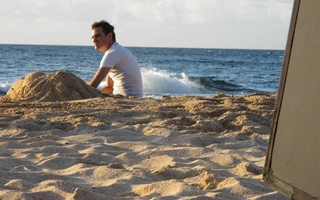A desire to understand why America remained passive despite increasing incidences of violence towards Jews in Germany in the 1930s inspired Erik Larsen to write his most recent book “In the Garden of Beasts: Love, Terror, and an American Family in Berlin,” the author explained in a talk in Sanders Theatre Wednesday evening.
Larsen’s book chronicles the experiences of William E. Dodd, the American Ambassador to Germany from 1933 to 1937, and his family as they represented America during the years leading up to the outbreak of World War II.
“What would it have been like to be in Berlin in the 1930s and to not have known what was coming?” said Larsen.
He said he had been intrigued by Dodd because of Dodd’s lack of experience in politics, but wanted to focus the narrative on his daughter, Martha Dodd, who had countless affairs with powerful men in the Third Reich, and whose personal correspondences and diaries—which span seventy linear feet of writing—are preserved in the Library of Congress.
The talk also featured rare footage from the United States Holocaust Memorial Museum of Martha Dodd and the various men she interacted with while in Berlin.
Another clip showed President Franklin D. Roosevelt addressing the American people as he stated them that “the United States must remain...un-entangled and free,” even while reports of violence in Germany appeared in newspapers every day.
“The problem with ‘could have done’ and ‘would have done’ is we didn’t do it,” said Larsen, refocusing his audience’s concern from what American failed to do to stop the Holocaust to what we must do as a country to prevent future genocides.
The title for Larsen’s book refers to the Tiergarten, the central park in Berlin around which many governmental buildings of the Third Reich were located.
“All of the action, at least in the book, takes place around the garden because it was the only place you could go without feeling surveyed,” Larsen said.
One couple in the audience said that they were convinced to visit Berlin after reading Larsen’s book. Mae Rockland Tupa said that her grandparents died in World War II after running to a synagogue that was soon torched.
“I had not wanted to go to Berlin for all those reasons, but...we said, ‘we have to visit Berlin to get things in perspective,’” Tupa said.
“Walking through the Tiergarten, we could recall passages from the book,” her husband Myron Tupa added.
—Staff writer Virgina R. Marshall can be reached at virginarosemarshall@college.harvard.edu.
Read more in News
Harvard Yield for Class of 2016 Soars to 81%Recommended Articles
-
 MIT's Russian Agreement and Other News
MIT's Russian Agreement and Other News -
LETTER: Fostering Discussion on FaithThe more we know and appreciate, the better off we are in dealing with the sweeping trends of culture, and how best to receive new neighbors who have different customs.
-
 FDIC Chair Sheila Bair Defends Financial Reform
FDIC Chair Sheila Bair Defends Financial Reform -
 ‘Master’ More Than A Cult Classic
‘Master’ More Than A Cult Classic -
Joaquin PhoenixCrimson arts editor Petey E. Menz explains his choice for the Best Actor award.
-
'I am Radar' More than EpicLarsen's writing drips with creativity; the characters are deep and engaging. In the shortest summation that can be mustered: “I Am Radar” is a journey that far surpasses its destination.













